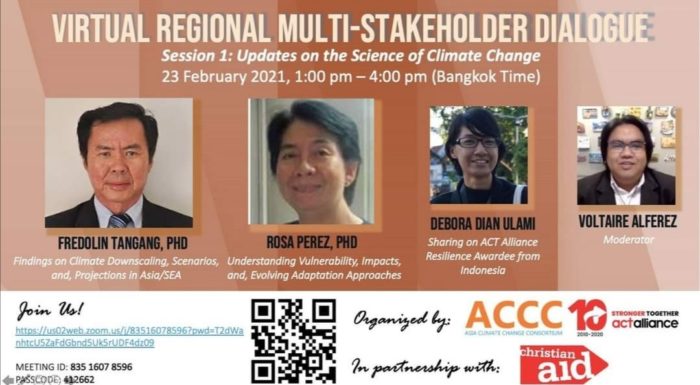“Climate change is global, resilience is local.” Climate Dialogue in Asia & the Pacific Region takes place
The first session of the Regional Multi-stakeholder Dialogues for Asia and the Pacific took place online on Tuesday 23rd February. The session titled, “Updates on the Science of Climate Change”, is one of a series of dialogues bringing together scientists, faith based organizations, ACT Alliance members and government representatives in the region together to explore climate change issues.
The event was organized by ACT Alliance, the Asia Climate Change Consortium (ACCC) and in partnership with Christian Aid.
“Climate scientists have a role to play in the climate change discussion”, said Prof. Fredolin Tangang, Professor of Climatology and Physical Oceanography at the Universiti Kebangsaan Malaysia, and Vice-Chair of the Intergovernmental Panel on Climate Change (IPCC) working group on the 5th Assessment Report. “The information needs to be downscaled and refined to the local level”, he stated while sharing his findings on climate downscaling, scenarios and projections in South-East Asia. The scientist warned of more droughts and floods to come in the future, even in years without the “El Nino” phenomenon. Prof. Tangang called for stronger collaboration between scientists, civil society and decision-makers to make the shift towards green economies.
Concrete steps to take
Dr Rosa Perez, Research Fellow at the Manila Observatory, and a climate scientist specializing in hydro-meteorology, disaster risk reduction and adaptation policies on climate change, spoke about vulnerability impacts and the evolving adaptation approach. Dr Perez summarized the findings of the 6th IPCC assessment report, highlighting relevant data concerning climate change and also showing how socio-economic factors might change in the years to come. Dr Perez highlighted the importance of climate finance for vulnerable countries and communities and noted the significance of integrating climate risks into policy. Dr. Perez also called for the need to ensure that budget decisions and investments are made towards locally led adaptation. “Climate change is global, but resilience is local,” she stated.
Local solutions to global problems
Ms Debora Dian Ulami of ACT member YAKKUM Emergency Unit (YEU), winner of the 2019 ACT Alliance Resilience Award, shared YEU’s experiences building resilience in the Yogyakarta Province and confirmed Dr. Perez’ conclusion that resilience was local.
YEU’s project provided resources and support to strengthen grassroots women’s capacities by providing training, disaster simulation, peer-learning and dialogue with decision-makers and positioned women as experts in vulnerability mapping, empowering them to take the lead in determining resilient and sustainable practices. Community-based organizations were also presented with an opportunity for peer learning exchange and the chance to get involved in public forums at the national and global level.
This dialogue has been made possible through the support of ACT member, Brot für die Welt (BftW), through ACT’s Climate Justice project, “Faith actors enhancing inclusive, ambitious and sustainable climate policy and action in accordance with the Paris Agreement and the Sustainable Development Goals.”
A recording of the session is available here.
